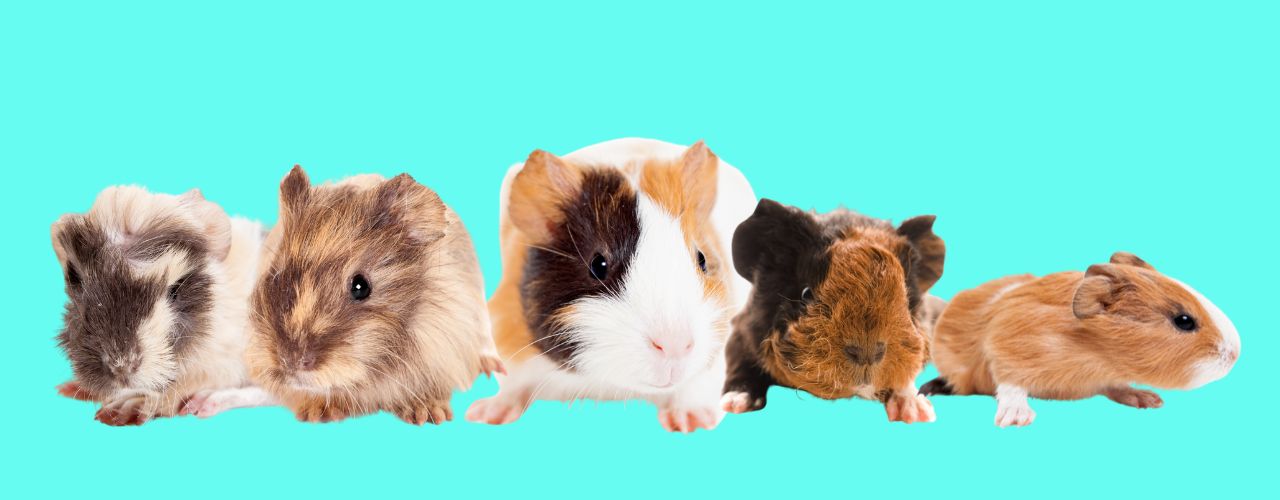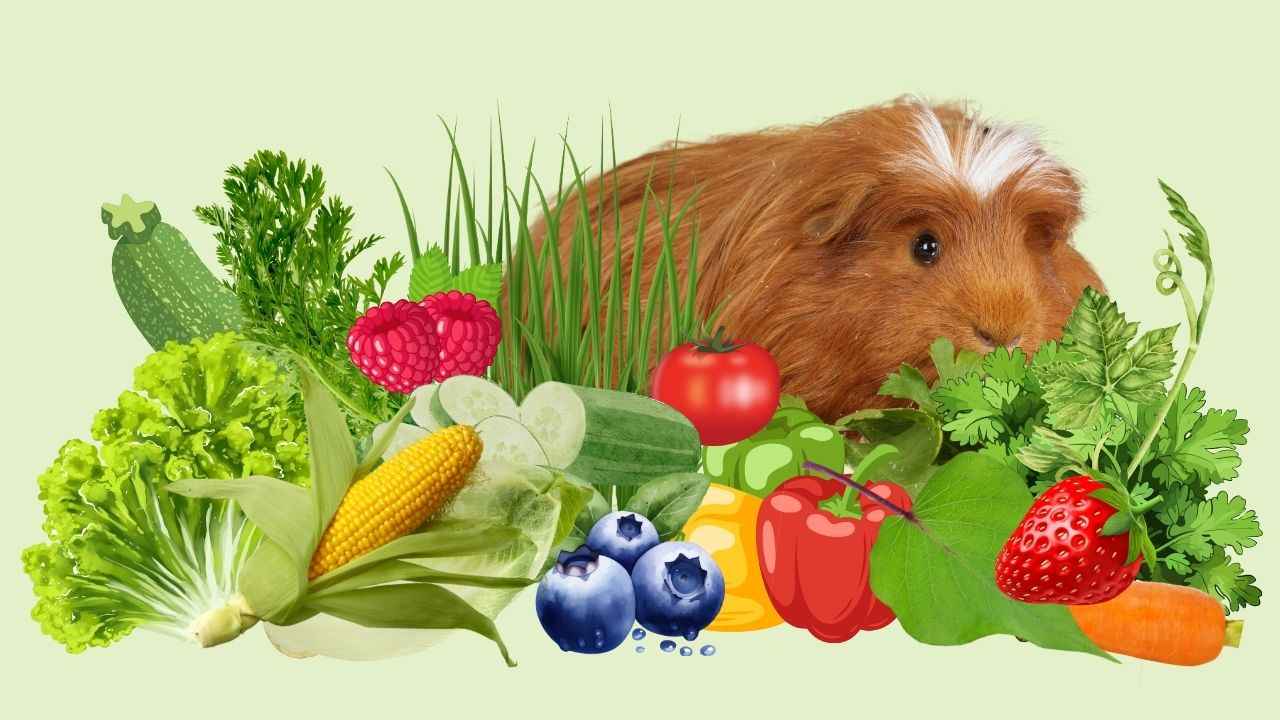An overview of feeding fresh foods to your guinea pigs.
Download our simplified Reference Sheet here.
With so many different types of fruits and vegetables at the grocery store and so much conflicting information online about which of them are good for your guinea pigs, what should be a simple task of offering them fresh food can turn into an overwhelmingly complex task and may leave you feeling like you will never be able to provide the proper nutrition for your guinea pigs. But that’s not the case! With this simplified guide, you have an easy list of different fresh foods that are healthy to feed regularly. We have also included a list of foods that you should never feed your guinea pigs to ensure you have the confidence to feed a healthy and varied diet to your guinea pigs. So if you’re wondering: What Foods Can Guinea Pigs Eat? Here’s a list of fruits and vegetables that can be given to guinea pigs regularly!

What foods can guinea pigs eat regularly?
Guinea pigs thrive on a varied diet rich in fresh greens, vegetables, and fruits. The following foods are not only safe but also highly nutritious for your guinea pigs. These can be fed regularly as part of a balanced diet. (Please note that we are using the colloquial understanding of the word “vegetable” and are aware that some of these foods, like cucumbers, are actually fruits.)
Greens:
- Lettuce (Romaine or Green Leaf)
- Low in calcium and high in fiber, it’s a hydrating and easily digestible green. Avoid iceberg lettuce due to its low nutritional value.
- Sweet Potato Leaves
- Rich in fiber and antioxidants, these leaves support digestive health and immune function.
- For those in a warm climate, these are super easy to grow! Learn how in our guide to growing food for your guinea pigs.
- Parsley
- A great source of vitamin C, essential for guinea pigs, as they cannot produce it on their own. Feed in moderation due to its high calcium content.
- Parsley can be easily grown with a $1 seed packet and some soil, learn more in our guide to growing food for your guinea pigs.
- Endive
- Low in calories and a good source of vitamins and minerals like vitamins A, K, and folate.
- Grape Leaves
- Contain antioxidants and have a high fiber content, making them excellent for gut health.
- Wheatgrass
- Packed with vitamins A, C, and E, wheatgrass is also incredibly easy and quick to grow – read our wheatgrass guide here.
- Corn Husk
- High in fiber, corn husks aid in digestion and are a great source of roughage for guinea pigs.
Vegetables:
- Carrots
- Rich in beta-carotene and other vitamins. They are a sweet treat, so only feed one baby carrot or a few slices of whole carrot at a time.
- Bell Peppers (Any Color)
- An excellent source of vitamin C and antioxidants. Red bell peppers have the highest vitamin C content.
- Another fairly easy vegetable to grow yourself, learn more in our guide to growing food for your guinea pigs.
- Tomatoes
- Contain vitamins A and C. Ensure you only feed the ripe fruit, avoiding leaves and stems which are toxic.
- Another easy vegetable to grow yourself, learn more in our guide to growing food for your guinea pigs.
- Zucchini
- Low in calories and provides hydration along with a good amount of vitamin C.
- Cucumber
- High in water content, it helps with hydration and is low in calories.
Berries:
- Blueberries
- High in antioxidants and vitamins like vitamin C, they’re a healthy sweet treat. Feed a few berries at a time due to sugar content.
- Strawberries
- Another antioxidant-rich fruit, packed with vitamin C. Strawberry leaves and tops are also safe and good for guinea pigs!!
- Raspberries
- Low in sugar compared to other fruits and high in fiber and vitamin C, making them a great occasional treat.
Flowers:
Did you know there are also quite a few flowers that guinea pigs can eat? Though you won’t find these in the grocery store, you may have some edible flowers in your garden or could forage for some!

9 Foods You Should Never Feed Guinea Pigs
Certain foods can be harmful or toxic to guinea pigs. Here’s a list of foods to avoid and why:
- Iceberg Lettuce
- Very low in nutrients and can cause diarrhea due to its high water content.
- Potatoes and Potato Leaves
- Contain solanine, a toxic substance that can cause serious health issues.
- Onions, Garlic, and Chives
- Can cause gastrointestinal upset and hemolytic anemia in guinea pigs.
- Avocado
- High in fat and contains persin, which is toxic to guinea pigs.
- Chocolate
- Guinea pigs cannot process sugars, contains theobromine, which is toxic.
- Dairy Products
- Guinea pigs are lactose intolerant and cannot digest dairy.
- Bread and Cereals
- Too high in carbohydrates, leading to digestive problems.
- Nuts and Seeds
- High in fats, which are difficult for guinea pigs to digest and can cause obesity.
- Mushrooms
- Some mushrooms are toxic, and it’s best to avoid them altogether.
A Varied Diet is Best
While we’ve answered “what foods can guinea pigs eat” with the foods listed above, it’s crucial to provide a varied diet to ensure your guinea pig gets a balance of nutrients. Rotate their diet to include different greens, vegetables, and fruits while always ensuring fresh hay and water are available. That’s why we included a section on our free care charts to write down the veggies and other fresh food that you feed your guinea pigs each week, so you’re able to effectively balance their diet!
In addition to these fresh foods, guinea pigs should be fed a high-quality pellet. For adult guinea pigs, choose a Timothy-based pellet, while for babies and pregnant/nursing mothers, an alfalfa-based pellet is recommended. We recommend Oxbow pellets, such as this one, which provides balanced nutrition specifically designed for guinea pigs. Learn more about a proper guinea pig diet here.
Remember, treats like fruits should be given in moderation due to their sugar content, and always introduce new foods gradually to monitor for any adverse reactions.
While this guide was intended to be simple and easy to understand, you may be interested to dig a little deeper into guinea pig nutrition. If so, we’d recommend checking out Guinea Lynx’s page for more info.
A big reason we chose these foods is for their low calcium. Though a vital nutrient for guinea pigs, too much calcium can cause bladder sludge and stones. If you want to learn more about that Oxbow has a great article all about bladder sludge.
Did you see our handy reference sheet so you can see these lists at a glance? View it below and download it here.
*Links may be affiliate

